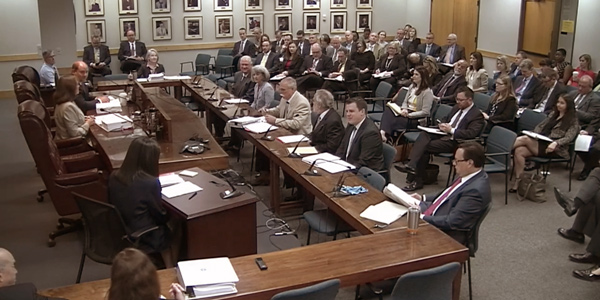By Tom Kleckner
Texas regulators last week pressed Southwestern Public Service for more details to justify its plan to build 1.23 GW of wind generation even though it doesn’t need the capacity.
The company and parties to a settlement over the project agreed to file additional written comments to its application for construction (Docket No. 46936).
The Texas Public Utility Commission’s staff has issued a conditional approval of the wind farms’ construction, but the commissioners expressed reservations.
“Where I am now, you’re not going to like the answer,” PUC Chair DeAnn Walker told the parties to the agreement during an April 13 open meeting. “The more information you can provide me, the more likely it is you can satisfy the concerns I have.”
Walker raised a number of issues with the parties, the central one being “upon what legal basis” the PUC can grant an application for new generation “when the applicant admits that there is currently sufficient generating capacity on its system to serve its customers?”
SPS announced last year that it intended to build a pair of wind farms in Texas and New Mexico and secure a long-term contract for energy from another facility as part of parent Xcel Energy’s multistate investment in wind. Xcel said the projects are expected to save the region’s customers about $2.8 billion over a 30-year period.
The company said in March it had reached an agreement with commission staff, the International Brotherhood of Electrical Workers and Lea County Electric Cooperative. SPS said nine other parties in the docket do not oppose the company’s request. The State Office of Administrative Hearings has admitted the settlement testimony into the record and remanded the case back to the PUC without holding a hearing.
Commissioner Arthur D’Andrea echoed Walker’s comments, saying he had “strong discomfort” with the deal.
“The fact it’s a settlement makes it more difficult to see what’s going on,” D’Andrea said. “My understanding is that the usual role of the commission is to approve something that looks like a taxing authority. The utility, in return, builds generation. This looks like billions of dollars in taxing authority and in return, the citizens get a wind deal and production tax credits.”
SPS President David Hudson responded that the generation would save ratepayers money through avoided fuel costs from other generation and the production tax credits (PTCs). He said the project qualified for 100% of the PTCs by purchasing wind turbines in 2016.
“PTCs at 100% value are pretty substantial,” Hudson said, noting the rate would be more than 3 cents/kWh after revenue requirement tax calculations. “That’s it automatic flow back to customers as a benefit, plus the avoided fuel costs. So, it’s true, [customers] will be paying the capital cost for the investment and recovery in base rates, but they’ll be getting substantial benefits through … zero-fuel energy and credit for the [PTCs].”
“I appreciate you are being creative,” D’Andrea said. “I’m not trying to say, ‘Spend a half billion on coal plants and improve the scrubbers.’ I wouldn’t want to throw bad money after bad money. I’m a little worried this goes too far. You basically say you don’t need this generation and that this is purely a financial play. That seems to be a strange thing for us to be approving.”
Attorney Rex VanMiddlesworth, representing Texas Industrial Energy Consumers, agreed with D’Andrea that SPS’ application is “unusual” but said that if there’s an “honest broker” in the proceeding, it’s his consumers group.
“Our jaundiced view of the utility is they make money, whether a plant is economical or not,” VanMiddlesworth said. “We want to look at whether this is good for the ratepayers. There’s a lot of risk. What if it goes over budget or doesn’t perform well? We ultimately concluded that this plant was very likely going to save Texas ratepayers hundreds of millions of dollars over its life.”
D’Andrea said he could support the project based on its economics, but that he needed more than a handful of spreadsheets before rendering a decision.
The parties promised to supply the commissioners with additional information in a week. The PUC next meets in open session April 27.
SPS has proposed building a 478-MW wind farm in West Texas and a 522-MW facility in New Mexico, though only the Texas project is part of the proceeding. The company also plans a 30-year power purchase agreement for an additional 230 MW of wind generation from Bonita Wind Energy, a NextEra Energy Resources subsidiary.
PUC Approves Transfer of Bankrupt ExGen’s Assets
The commission also approved the transfer of nearly 3.5 GW of gas-fired power plants from bankrupt merchant generator ExGen Texas Power to its creditors: Fidelity Management & Research, Fortress Credit Advisors, GSO/Blackstone Debt Funds Management, Guggenheim Partners Investment Management, Oppenheimer Funds, PineBridge Investments and Avenue Capital Management.
Walker and D’Andrea agreed with staff’s recommendation to approve the transfer, which staff noted would give ExGen and the creditors and affiliates a combined 7.6 GW of capacity, 8.2% of the generation capacity in ERCOT or capable of delivery into the grid (Docket No. 47836).
“As the total combined capacity is below the 20% threshold, necessarily, the capacity owned and controlled by each applicant individually is also below the 20% threshold,” staff wrote.
ExGen, an Exelon subsidiary, filed for Chapter 11 bankruptcy in November, blaming low wholesale prices due to cheap gas and increasing wind production.
The five plants are: Wolf Hollow I, Colorado Bend I, Mountain Creek, LaPort and Handley.
Non-IOUs to be Added to Rate Review Schedule
The commissioners adopted a new rate review schedule for investor-owned utilities and asked staff to include non-IOUs in the same rule (Docket No. 47545).
The rule revision implements the provisions of Texas SB 735.
Staff’s proposal sets a schedule for 10 IOUs, beginning with Texas-New Mexico Power in August and ending with Oncor in October 2021.







